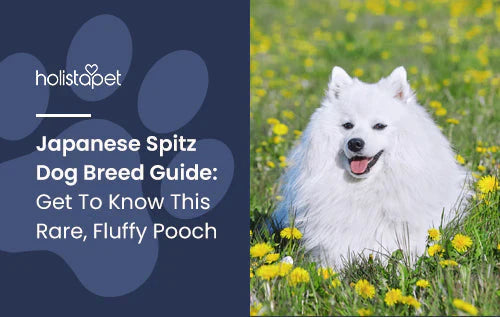The Japanese Spitz packs quite a punch in a small package. This rare pooch breed has a furry white coat, undying loyalty, and a contagious smile. Originating from Japan, Japanese Spitz dogs are wonderful companions that are great with children and families.
Also called the "cloud dog," Japanese Spitz are extremely intelligent and eager to learn new things. In addition, they always look like they are in a good mood because of the permanent smile on their face. Let's learn more about this fun pup by looking deeper into its characteristics, history, special needs, and much more in this Japanese Spitz dog breed guide!
Japanese Spitz Characteristics (Physical)
The Japanese Spitz is a relatively small dog breed, but it's larger than the German Spitz. Their head is balanced to the rest of their body and is moderately broad and round. These dogs have dark, almond-shaped eyes with triangular, pricked ears and a pointed muzzle with a slightly rounded tip.
Overall, the Japanese Spitz is a well-balanced, compact dog breed that exudes elegance and beauty with its flowing mane and poised stature. The lifespan of this breed is between 10 to 16 years.

Japanese Spitz Dog Breed Size
This delicate-looking pup is rather compact, but compared to other small dogs like a Pomeranian, they are slightly bigger. From the height at the shoulder, the Spitz can be around 12 to 15 inches tall. As for its weight, the Spitz usually falls somewhere around 10 to 20 lbs.
Japanese Spitz Personality
These fun-loving dogs have wonderful personalities. They are family-friendly and very easy to get along with. They enjoy soaking in as much attention as they can get and do not enjoy being ignored or left alone for a long time. The Spitz has a playful spirit with a moderate amount of energy. They enjoy playing catch, frisbee, and other agility-type games. They are also very social and great with other dogs.
In general, Spitz are very protective and do not let their size keep them from being the family watchdog. They have a surprisingly loud bark and will alert you when any stranger enters their territory. However, they will eventually calm down when their owners reassure them that they are not a threat. As a whole, the breed is incredibly loyal, obedient, and affectionate. They are always eager to please and make their owners feel loved.
Japanese Spitz Dog Breed Exercise
The Spitz is a small enough size where they can adapt to most living situations. Whether you live in an apartment or on a large farm, your Spitz will thrive with whatever amount of space they are given. These dogs need a regular amount of exercise to stay happy and healthy. Taking your Spitz on a daily walk or a light hike will keep them physically and mentally well.
Japanese Spitz dogs are also very playful and enjoy many agility games such as fetch and frisbee. Their energy level is fairly moderate and not overwhelming. So if you are a person who is only casually active, your pup won't mind any downtime spent on the couch cuddled up next to you.
Japanese Spitz Training
Japanese Spitz dogs are incredibly smart and always eager to learn new things to make their trainer happy. As with any dog, it is always best to start training early so they do not retain any bad habits when they grow up. This rule also applies to training a Spitz because of their innate territorial personality.
To ensure your Spitz is not stand-offish or constantly barking at strangers, providing opportunities for socialization at an early age is key. As a puppy, the more they get used to seeing new people and other dogs, the friendlier they will be when they are older.
Puppy training classes can also be beneficial for a Spitz. In these classes, you can learn how to properly command your pup, teach them how to walk on a leash, and behave in social situations.
When training your pup, it is important to go at a slow pace. You do not want to overwhelm your Spitz with too much information that they may forget immediately after teaching. Be patient with the process and trust that your dog will learn everything you are willing to teach them.

Japanese Spitz Dog Breed History
This dog breed is a descendant of several white German Spitz dogs brought from China to Japan. In Japan 1921, the Japanese Spitz debuted at a dog show in Tokyo, turning many heads in the Spitz community.
As the years went by, many white Spitz breeds were being imported from all over the world, such as Australia, Canada, Siberia, and the United States. These early Spitz dogs were crossbred to produce more desirable traits with a better temperament, resulting in what we now know as the Japanese Spitz.
It wasn't until after World War II when the Spitz breed was finalized, and the Japan Kennel Club finally recognized the Japanese Spitz. Around the 1950s, Japanese Spitz dogs were being exported all over the world to places like Sweden and England, getting recognition from kennel clubs in other countries.
However, the American Kennel Club has yet to recognize the Japanese Spitz as a separate breed. This is most likely due to its strong resemblance to the American Eskimo Dog, which has incredibly similar features to the Japanese Spitz.
Common Health Problems in the Japanese Spitz
As with any dog breed, some health problems can potentially occur. Generally, Japanese Spitz dogs are a healthy breed and have a generous lifespan of 10 to 16 years, but there are a few concerns you may want to keep an eye out for.
Luxating Patellas
Luxating Patellas is a condition in which the kneecaps become dislocated. This means that the kneecap has moved and is no longer in its original location. This condition can potentially be painful, and you may see your Spitz hopping around using only three legs or are hesitant about running. Luxating Patellas can be corrected through surgery if the situation is severe.
Dry Skin
Spitz are prone to having dry skin because of their thick and dry coat. Too many baths may dry out their skin and lead to dermatitis. If you bathe your dog too much, this can remove the natural oils on their skin that keep it moisturized and healthy.
Runny Eyes
Japanese Spitz are also known to develop runny eyes. So it is best to regularly clean their tears with a moist towel to prevent any sores or tear-stains from developing.
How to Care for a Japanese Spitz
These dogs are relatively low-maintenance and don't require excessive care. Because of their size, they can adapt to most living situations. So if you live in a small apartment, your Spitz will be able to adjust as long as they can go on a daily walk. They also enjoy a good play session with a frisbee or tennis ball to stay healthy and fit.
Japanese Spitz are very loyal and easily trainable, making them the perfect pet to have around the house. As much as Spitz enjoy playing and going for walks, they also don't mind a night in on the couch watching a movie with you. They prefer warmth over cold, so they will have no problem being lazy and lounging around.
Regular vet checkups are important to keep an eye on any potential health problems and to make sure a healthy weight is maintained and vaccines are up to date.
Nutrition and Feeding for a Japanese Spitz
As with any dog breed, size, weight, and age should be considered when formulating a meal schedule. A Japanese Spitz should be fed high-quality food formulated for a small-to-mid-sized breed. It is recommended to consult your veterinarian to determine the best brand of food for your dog.
Portion-wise, feeding your Spitz two small meals a day should be plenty to ensure they have enough energy and nutrients to make it through the day. Feeding them more may lead to obesity, resulting in joint issues such as luxating patellas or other health concerns like diabetes.
Feeding your dog treats can be an excellent way to train your Spitz, but keep their treat intake to a minimum so they do not get tired of eating their regular dog food and maintain a healthy weight. The same thing goes with human foods. Avoid giving your Spitz any table food because they can easily get used to it and may not want to eat their dog food anymore.
For any nutritional concerns or questions about your Japanese Spitz diet, check with your vet to ensure you are giving your pup the best food for their health.
Related: Organic Dog Food Vs Non Organic (In-Depth Comparison)

Coat Color and Grooming
Japanese Spitz have pure, white, double coats. The undercoat is thick and generous, while the outer coat is longer and helps repel dirt and debris. To prevent knots or matting, they should be brushed a couple of times a week. This will help remove any loose fur and keep their hair flowing and clean.
As mentioned earlier, this breed can suffer from having dry skin, so avoid bathing them too often. Too many baths can also remove the natural oil and moisture from their skin that helps keep their coat healthy. Bathing only once or twice per season should be enough, or when they get dirty and need it.
Overall, the grooming needs of a Japanese Spitz are lower than most other breeds. However, regular nail trims can prevent ingrown toenails and scratching of floors and furniture.
Related Post: 12 White Dog Breeds: Cute, Cuddly, and Classy
Children and Other Pets
Japanese Spitz are incredibly friendly and of gentle nature. They are great with small children because they are not an overwhelming size and love to play. Also, since these dogs are smaller, they are less likely to knock over any kids or furniture when the playing gets a little rough. Early training is the best way to ensure that your Spitz knows how to play nicely with kids.
Japanese Spitz do relatively well with other pets and can live harmoniously with other dogs in the house. Although they can be territorial with strangers, they are not naturally aggressive with other pets. But to make sure that your Spitz can interact with other dogs and not have issues, we highly recommend early socialization and puppy training.
Japanese Spitz Dog Rescue Groups
If you are looking for your own Japanese Spitz, you may have some difficulty trying to adopt one because of how rare they are to find in North America. However, here are a few wonderful rescue groups you can contact that will hopefully make your Spitz dreams come true.
Rescue Me! has a portion of their website dedicated to connecting future pet owners with their very own Japanese Spitz. The Spitz rescue team has provided loving homes to over 900 Japanese Spitz dogs. Founder Jeff Gold started out rescuing boxer breeds in his home state of Georgia and rescued over 500 boxers within the first two years. Rescue Me! works with adoption centers all over the country to bring you the pup that you want.
Dogtime is an incredible resource with information about every dog breed and resources for you to use to adopt your very own pup. Although Japanese Spitz are rare to find, you can still browse their site and see what kind of dogs need a loving home. If you are looking for something similar to the Japanese Spitz, a German Spitz, and the American Eskimo Dog are also very similar.

Japanese Spitz Dog Breed Organizations
Breed organizations dedicated to the Japanese Spitz are a rather interesting subject because the American Kennel Club does not currently recognize the Japanese Spitz due to its similarities with the American Eskimo Dog. However, there are organizations that recognize the Japanese Spitz.
The Japanese Spitz Club of USA is a dedicated group of breeders in the United States whose mission is to keep the Japanese Spitz's bloodline alive and well. In addition, this club is committed to teaching the masses about the wonderful Spitz breed and connecting loving homes with a Spitz dog of their own.
The American Kennel Club does not recognize the Japanese Spitz Club of USA. However, the United Kennel Club (UKC), the American Rare Breeds Association (ARBA), and the Continental Kennel Club (CKC) — all of which reside in the United States — do recognize them.
More About the Japanese Spitz
The Japanese Spitz, which originated from Japan, is known there as the "Nihon Supittsu." These dogs are still a very popular breed in Japan, as well as in different parts of Europe and the United States. This easy-to-love, low-maintenance pup is a popular choice for companionship all over the world!


 CBD Oil for Dogs - Fast Acting
CBD Oil for Dogs - Fast Acting
 Chicken Flavored CBD Oil For Dogs - Easy Dose
Chicken Flavored CBD Oil For Dogs - Easy Dose
 Salmon Flavored CBD Oil For Dogs - Highly Rated
Salmon Flavored CBD Oil For Dogs - Highly Rated
 CBG Oil for Dogs and Cats - Loved by Thousands
CBG Oil for Dogs and Cats - Loved by Thousands





Leave a comment
All comments are moderated before being published.
This site is protected by hCaptcha and the hCaptcha Privacy Policy and Terms of Service apply.